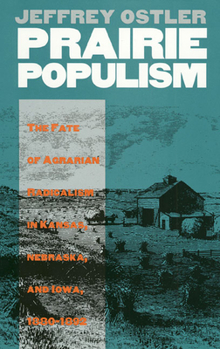Prairie Populism: The Fate of Agrarian Radicalism in Kansas, Nebraska, and Iowa, 1880-1892
The Plains states in the late 1800s flung open their political doors to the Populist party while their fellow midwestern neighbors to the east left it standing on the porch. Why the contrasting receptions? Traditionally the disparity has been attributed solely to economic differences. A superficially logical answer, says Jeffrey Ostler, but too simple. Ostler contends that the distinction historians have made between "hardship" on the Plains and "prosperity" to the east is overdrawn. Through a comparison of economics and politics in two Populist states--Kansas and Nebraska, and one non-Populist state--Iowa, he shows that in addition to financial influences, the contours of the existing political order played a key role in determining the fate of populism. In the process of explaining why populism ultimately failed to become a national movement, he also illuminates the perennial question of why third parties in the United States have met with little success.
Format:Hardcover
Language:English
ISBN:0700606068
ISBN13:9780700606061
Release Date:October 1993
Publisher:University Press of Kansas
Length:272 Pages
Weight:1.40 lbs.
Dimensions:1.0" x 6.9" x 9.0"
Customer Reviews
0 rating





